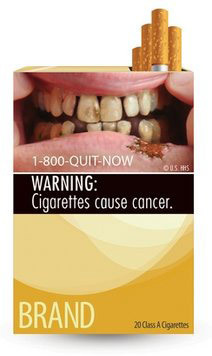|
 This image provided by the US Food and Drug Administration on Tuesday, June 21, 2011 shows one of nine new warning labels cigarette makers will have to use by the fall of 2012. |
|
Rotting teeth and gums. Diseased lungs. A sewn-up corpse of a smoker. Cigarette smoke coming out of the tracheotomy hole in a man's neck. Cigarette packs in the US will have to carry these macabre images in nine new warning labels that are part of a campaign by the Food and Drug Administration to use fear and disgust to discourage Americans from lighting up. The labels, announced on Tuesday, represent the biggest change in cigarette packs in the US in 25 years. At a time when the drop in the nation's smoking rate has come to a standstill, the government is hoping the in-your-face labels will go further than the current surgeon general warnings toward curbing tobacco use, which is responsible for about 443,000 deaths a year in the US. "These labels are frank, honest and powerful depictions of the health risks of smoking," Health and Human Services Secretary Kathleen Sebelius said in a statement. The FDA estimates the labels will cut the number of smokers by 213,000 in 2013, with smaller additional reductions through 2031. Other countries such as Canada and Uruguay have used graphic, even grisly, warnings for years, and various studies suggest they spur people to quit. But exactly how effective they are is a matter of debate, since the warnings are usually accompanied by other government efforts to stamp out smoking. "I think it's a great deterrent for kids," said Kristen Polland, 24, of Prattville, Ala. "If you start there, you have won half of the battle." Rhonda Vanover, 43, of Cincinnati, on the other hand, said: "No one is going to stop me -- unless they make it illegal. Cigarettes get me through the day. They are part of my life." The labels also include images of a smoker wearing an oxygen mask and a mother and baby with smoke swirling nearby. Some images are not graphic at all; one shows a man wearing an "I Quit" T-shirt. The warnings will take up the entire top half — both front and back — of a pack of cigarettes. They must also appear in advertisements and constitute 20 percent of each ad. Cigarette makers will have to run all nine labels on a rotating basis. They have until the fall of 2012 to comply. (Read by Nelly Min. Nelly Min is a journalist at the China Daily Website.) (Agencies) |
腐爛的牙齒和牙齦。病變的肺。吸煙者被縫合上的尸體。從男人脖子上的氣管套管洞中飄出的煙。 這些恐怖的圖像將出現(xiàn)在美國(guó)香煙盒的九種新警示標(biāo)識(shí)上。美國(guó)食品和藥品監(jiān)督管理局想利用這種新警示標(biāo)識(shí)讓美國(guó)民眾感到恐懼、惡心,從而讓其放棄吸煙。這些新警示標(biāo)識(shí)是美國(guó)藥管局戒煙運(yùn)動(dòng)的一部分。 這些警示標(biāo)識(shí)是在周二發(fā)布的,是美國(guó)25年來(lái)在香煙盒上做的最大變動(dòng)。 在全國(guó)吸煙率停止下降的情況下,美國(guó)政府希望這種刺激眼球的警示標(biāo)識(shí)能夠比當(dāng)前衛(wèi)生局局長(zhǎng)發(fā)出的控制煙草使用的警告更有效。吸煙每年造成美國(guó)44.3萬(wàn)人死亡。 美國(guó)衛(wèi)生與公共服務(wù)部部長(zhǎng)凱瑟琳?西貝利厄斯在一項(xiàng)聲明中說(shuō):“這些警示標(biāo)識(shí)直白、有力地描述了吸煙對(duì)于健康的危險(xiǎn)。” 美國(guó)藥管局估計(jì)這些警示標(biāo)識(shí)將讓美國(guó)煙民數(shù)量在2013年減少21.3萬(wàn),到2031年還會(huì)繼續(xù)減少,盡管幅度不會(huì)那么大。 有些國(guó)家,如加拿大和烏拉圭,數(shù)年來(lái)都在使用這種恐怖圖像作為警示標(biāo)識(shí)。多項(xiàng)研究表明這種警示標(biāo)識(shí)會(huì)促使人們戒煙。但是具體而言這些警示標(biāo)識(shí)的效果如何仍存在爭(zhēng)議,因?yàn)樵诰緲?biāo)識(shí)之外,通常還伴隨著政府的其他戒煙措施。 來(lái)自阿拉巴馬州普拉特維爾的24歲的克里絲藤?波蘭德說(shuō):“我認(rèn)為這對(duì)于孩子是一個(gè)很好的震懾手段。如果你從孩子抓起,仗就打贏了一半。” 來(lái)自辛辛那提市的43歲的榮達(dá)?凡諾維爾卻說(shuō):“沒(méi)有人可以阻止我,除非他們規(guī)定吸煙是違法的。有了香煙,我這一天才熬得過(guò)去。它們是我生活的一部分。” 這些警示標(biāo)識(shí)還包含帶著氧氣面罩的吸煙者的圖像,還有煙霧繚繞中的母親和嬰兒的圖像。也有些警示標(biāo)識(shí)不包含圖像。有一個(gè)警示標(biāo)識(shí)是一個(gè)男人身穿“我要戒煙”T恤。 這些警示標(biāo)識(shí)將被印在香煙盒的上半部分(正反面都如此)。它們還須占據(jù)香煙廣告面積的20%。從2012年秋天開(kāi)始,煙草生產(chǎn)商將必須輪流印制九種警示標(biāo)識(shí)的香煙盒。 相關(guān)閱讀 美國(guó):香煙盒將采用新警示標(biāo)識(shí) (中國(guó)日?qǐng)?bào)網(wǎng)英語(yǔ)點(diǎn)津 陳丹妮 編輯:馮明惠) |
|
Vocabulary: tracheotomy: a medical operation to cut a hole in somebody's trachea so that they can breathe(氣管切開(kāi)術(shù)) macabre: unpleasant and strange because connected with death and frightening things 可怕的,恐怖的(尤指與死亡等相聯(lián)系的) in-your-face: used to describe an attitude, a performance, etc. that is aggressive in style and deliberately designed to make people react strongly for or against it (態(tài)度、表演等)赤裸裸的,富刺激性的,有意惹人發(fā)怒的 surgeon general: (美國(guó))衛(wèi)生局局長(zhǎng) graphic: (of descriptions, etc.) very clear and full of details, especially about something unpleasant(描述等)形象的,生動(dòng)的,逼真的(尤指令人不快的事物) grisly: extremely unpleasant and frightening and usually connected with death and violence(令人厭惡的;恐怖的;可怕的) stamp out: (尤指通過(guò)武力或不懈努力)消除,消滅,鎮(zhèn)壓 deterrent: a thing that makes somebody less likely to do something(= that deters them) 威懾因素;遏制力 |
